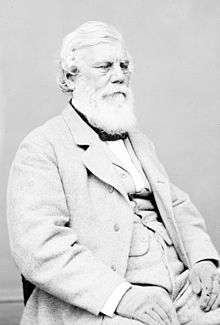William Aiken Jr.
William Aiken Jr. (January 28, 1806 – September 6, 1887) was the 61st governor of South Carolina, serving from 1844 to 1846. He also served in the state legislature and the United States House of Representatives, running unsuccessfully for speaker of the House in 1856 in "the longest and most contentious Speaker election in House history."
William Aiken Jr. | |
|---|---|
 | |
| 61st Governor of South Carolina | |
| In office December 7, 1844 – December 8, 1846 | |
| Lieutenant | J. F. Ervin |
| Preceded by | James Henry Hammond |
| Succeeded by | David Johnson |
| Member of the U.S. House of Representatives from South Carolina's 2nd district | |
| In office March 4, 1853 – March 3, 1857 | |
| Preceded by | James L. Orr |
| Succeeded by | William P. Miles |
| Member of the U.S. House of Representatives from South Carolina's 6th district | |
| In office March 4, 1851 – March 3, 1853 | |
| Preceded by | Isaac E. Holmes |
| Succeeded by | William W. Boyce |
| Member of the South Carolina Senate from St. Philip's and St. Michael's Parish | |
| In office November 28, 1842 – December 7, 1844 | |
| Member of the South Carolina House of Representatives from St. Philip's and St. Michael's Parish | |
| In office November 26, 1838 – November 28, 1842 | |
| Personal details | |
| Born | January 28, 1806 Charleston, South Carolina |
| Died | September 6, 1887 (aged 81) Flat Rock, North Carolina |
| Resting place | Magnolia Cemetery, Charleston, South Carolina |
| Political party | Democratic |
| Spouse(s) | Harriet Lowndes Aiken |
| Profession | businessman, planter |
Aiken was one of the state's wealthiest citizens, owner of the largest rice plantation in the state — Jehossee Island — with over 700 enslaved Blacks on 1,500 acres under cultivation, almost twice the acreage of the next largest plantation. By 1860, Aiken owned the entire Jehossee Island, and the plantation produced 1.5 million pounds of rice in addition to sweet potatoes and corn — in the middle of the 19th century, rice was king in South Carolina — of the 10 largest cash crops in 1850, seven were rice, two cotton and one sugar. After the Civil War, the plantation regained its preeminence, producing 1.2 million pounds of rice. Today, descendants of the Aiken family, the Maybanks, still own part of the island, having sold the remainder in 1992 to the U.S. as part of the ACE Basin National Wildlife Refuge.[1]
Early life
Aiken was the child of William Aiken, the first president of the pioneering South Carolina Canal and Rail Road Company. Unfortunately, William Sr. was killed in a Charleston carriage accident and never saw his namesake town of Aiken, South Carolina. Aiken graduated from the College of South Carolina (now the University of South Carolina) at Columbia in 1825 and engaged in agriculture as a planter, entering politics in 1837. He was a member of the State House of Representatives 1838–1842, and served in the State Senate 1842–1844.[2] His term as governor ran from 1844 to 1846.
Congressional service
Subsequent to his service as governor, Aiken served in the U. S. House of Representatives for the Thirty-second, Thirty-third, and Thirty-fourth Congresses (March 4, 1851 – March 3, 1857). In December 1855, Aiken was a leading candidate for Speaker of the House of Representatives. After two months and 133 ballots, Aiken lost the race to Nathaniel P. Banks by a vote of 103 to 100, in what has been termed "the longest and most contentious Speaker election in House history".[3]
Personal life
.jpg)
Aiken was married to Harriet Lowndes Aiken. He was a successful businessman and planter and lived in Charleston, South Carolina. Aiken's first cousin, D. Wyatt Aiken served as a Confederate States Army officer and five-term U.S. Congressman. Aiken died at Flat Rock, NC, September 6, 1887, and was interred in Magnolia Cemetery, Charleston, S.C. His house, the Aiken-Rhett House, is part of the Historic Charleston foundation.
References
- Scott, Thomas L. (December 23, 2014). "9 of the Biggest Slave Owners in American History". Atlanta Black Star. Retrieved May 16, 2019.
- "Biographical Directory of the United States Congress". U. S. House of Representatives, Office of the Historian.
- "Historical Highlights, February 02, 1856". U. S. House of Representatives, Office of the Historian. Retrieved September 11, 2013.
External links
| Wikimedia Commons has media related to William Aiken, Jr.. |
- United States Congress. "William Aiken Jr. (id: A000063)". Biographical Directory of the United States Congress.
| Political offices | ||
|---|---|---|
| Preceded by James Henry Hammond |
Governor of South Carolina 1844–1846 |
Succeeded by David Johnson |
| U.S. House of Representatives | ||
| Preceded by Isaac E. Holmes |
Member of the U.S. House of Representatives from South Carolina's 6th congressional district 1851–1853 |
Succeeded by William Waters Boyce |
| Preceded by James Lawrence Orr |
Member of the U.S. House of Representatives from South Carolina's 2nd congressional district 1853–1857 |
Succeeded by William Porcher Miles |
